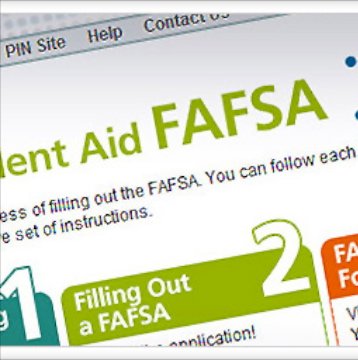FAFSA season, the financial aid and college admissions period, officially began January 1.
If you’re hoping to earn an undergraduate or graduate degree, or are the parent of someone going to college, you need to know all you can about the FAFSA, the Free Application for Federal Student Aid.
That’s the all-important document that must be filled out to determine your — or your child’s — eligibility for aid, such as scholarships, grants, work study or college loans. Ideally, you want to go after the free money and reduce student loans, which have to be repaid.
The best way to do that: pay a great deal of attention to carefully completing the FAFSA.
Even though the 2011-12 school year FAFSA remains long and a bit complex to complete (the form has 106 questions plus sub-parts for a grand total of 136 questions), you needn’t be overwhelmed by it.
For starters, there are free resources to help you get through it, such as the online tips and worksheets offered by the U.S. Department of Education and the National Association of Student Financial Aid Administrators.
Additionally, for those with the money to pay, legitimate companies like Student Financial Aid Services Inc. offer fee-based advice and expertise, for $79.99 to $99.99, to help you navigate the process. (Just avoid the scams out there).
Whether you opt for the do-it-yourself method or decide to hire a pro for help, here are five tips to help you maximize the amount of financial aid you or a loved one can receive to pay for college.
1. Pay Attention to Deadlines
When it comes to getting money for higher education, be aware that there are federal and state deadlines, and colleges have their own deadlines too. To rake in the most of amount of financial aid, you must meet all deadlines. Period. No excuses.
“Missing a financial aid deadline is worse than missing a mortgage payment,” says Kalman Chany, author of Paying for College Without Going Broke: 2011 Edition. “Your bank will probably give you another chance; the colleges probably will not,” Chany notes.
The federal deadline for submitting an online FAFSA application is June 30, 2012, but you can submit your FAFSA anytime after January 1, 2011.
Here is a link to each state’s FAFSA deadlines for 2011-12.
Tip: If the college you’ll be attending requires your completed application even earlier than the federal or state deadlines, use the school’s deadline as the date to submit all your paperwork. That way, you won’t miss any deadlines.
2. File Your Application ASAP — Estimating Your Income if Necessary.
Many people in need of college funding wait to fill out their FAFSA until after they file their income taxes, somewhere around April 15, 2011. That’s a big mistake. Instead, estimate your 2010 income as best as you can, and get that FAFSA in during the first quarter of the year. If your numbers are off, you can always revise or update the figures later.
Mary Fallon, a spokeswoman for Student Financial Aid Service Inc., which offers online and telephone assistance to students and parents, says you shouldn’t wait until your taxes are completed to file your FAFSA or you will miss most of the state and college student aid deadlines.
According to Fallon, 70% of all student aid deadlines for states and colleges are before April 15; Tennessee and Connecticut have the earliest: February 15.
Perhaps that’s why, to get a State Grant in Tennessee, education officials suggest applying “as soon as possible after January 1, 2011” because awards are made only “until funds are depleted,” according to the Department of Education’s website.
“Most programs award aid on a first-come, first-serve basis. Providing accurate estimates on the FAFSA as early as January 1, 2011 holds your place in the virtual aid line,” Fallon says.
3. Exclude Certain Income and Assets as Permitted.
Don’t include untaxed Social Security as income and don’t list your primary residence, car, boat or furniture as assets. If you report these items you will inflate your expected family contribution and lower the amount of aid for which you are eligible.
4. Carefully Consider the “Dislocated Worker” Questions.
With unemployment hovering near 10%, many people out of work are now going back to school to improve their career prospects.
If you, a spouse or a family member has been downsized, you may be eligible to answer “yes” to the “dislocated worker” questions on the FAFSA. (Question #82 asks: ‘As of today, is either of your parents a dislocated worker?’ Question #100 asks: ‘As of today, are you (or your spouse) a dislocated worker?’)
“You need to meet one of four criteria on the day that you submit your FAFSA,” says Fallon, adding: “Being a ‘dislocated worker’ affects how your assets are treated and could even reduce your expected family contribution to zero.”
A person can be considered a dislocated worker if any of the four criteria apply:
• He or she is receiving unemployment benefits due to being laid off or losing a job and is unlikely to return to a previous occupation;
• He or she has been laid off or received a lay-off notice from a job;
• He or she was self-employed but is now unemployed due to economic conditions or natural disaster; or
• He or she is a displaced homemaker (i.e. a former stay-at-home mom or dad who is no longer being supported by a spouse, and who is unemployed or underemployed)
5. Double-Check Everything.
With many thousands of dollars in financial aid at stake, now is not the time to be sloppy or to rush through your paperwork.
Make sure your last name is listed exactly as it’s shown on your Social Security card or your FAFSA will be rejected.
Also, double-check all your numbers and sign your form. Experts say that transposed numbers and forms that lack signatures are two common blunders — and both mistakes can slow down or jeopardize your request for aid.
Finally, be sure that you’re filling in the correct information in the correct spots. On the 2011-12 FAFSA, the colors are yellow for student information and purple for parent information.
Paying for college can seem like a huge financial burden. But you can reduce your economic stress by maximizing the financial aid you receive and giving the process of filling out the FAFSA the time and attention that it deserves.








